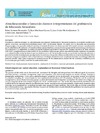Please use this identifier to cite or link to this item:
http://hdl.handle.net/10553/56252
| Title: | Abandono escolar y formación docente en Educación Secundaria | Authors: | Santana Hernández, Rafael Marchena Gómez, Rosa Martín Quintana, Juan Carlos Alemán Falcón, Jesús Ariel |
UNESCO Clasification: | 58 Pedagogía | Keywords: | Abandono escolar Formación inicial Profesorado de Secundaria Formación permanente Profesionalización docente, et al |
Issue Date: | 2018 | Journal: | Aula Abierta | Abstract: | El estudio se centró en averiguar las interpretaciones que elabora el profesorado de Educación Secundaria, en contraste con diferentes agentes educativos, con respecto al abandono escolar (AE) y la formación docente. Se adoptó para su desarrollo una perspectiva fenomenológica, seleccionando mediante muestreo intencional 54 centros. Se utilizó una entrevista semiestructurada cumplimentada por 51 orientadores, 95 profesores y 53 miembros de los equipos directivos, asi como diversos grupos de discusión en los que participaron 260 alumnos/as y 10 inspectores. Se realizó un análisis categorial utilizando el programa de Análisis Cualitativo de datos textuales (ATLAS.ti7), complementado con Microsoft Excel. Los resultados evidencian que, para la comunidad educativa analizada, el alumnado y su entorno familiar serían los factores que más incidirían en el AE. La formación docente no constituiría un elemento relevante, a pesar de las muchas investigaciones que argumentan lo contrario y las propias críticas que ellos elaboran sobre las insuficiencias de su formación. Tampoco se considera clave a la hora de buscar estrategias favorecedoras de la continuidad escolar. Los hallazgos obtenidos permiten entender mejor cómo se organiza la institución escolar de Secundaria ante la realidad del AE, ayudando a establecer pautas de actuación para prevenirlo y aumentar la continuidad escolar. The purpose of this study was to document and understand the thoughts and interpretations that different agents of secondary education (teachers, counselors, management, pupils and inspectors) have about school dropout and teacher training. Through an ethnographic methodology, it was used a phenomenological perspective for its development. 54 secondary schools were selected by purposive sampling. As research tools, we used semistructured interviews with 51 counselors, 95 teachers and 53 members of management as well as diverse discussion groups in which 260 students and 10 inspectors participated. We carried out a categorized analysis using Qualitative Data Analysis Program ATLAS.ti7 and Microsoft Excel. The results show that students and their families would be the factors that most influence at school dropout. Teacher training is not an important element, despite much research to argue otherwise, nor is considered key to enabling strategies when looking for school continuity. The results allow us to better understand how is the secondary school organized to the school dropout and therefore help us to establish effective guidelines for action to prevent it and increase school continuity. |
URI: | http://hdl.handle.net/10553/56252 | ISSN: | 0210-2773 | DOI: | 10.17811/rifie.47.3.2018.365-372 | Source: | Aula abierta [ISSN 0210-2773], v. 47 (3), p. 365-372 | URL: | http://dialnet.unirioja.es/servlet/articulo?codigo=6723288 |
| Appears in Collections: | Artículos |
WEB OF SCIENCETM
Citations
2
checked on Feb 25, 2024
Page view(s)
497
checked on Feb 24, 2024
Download(s)
418
checked on Feb 24, 2024
Google ScholarTM
Check
Altmetric
Share
Export metadata
Items in accedaCRIS are protected by copyright, with all rights reserved, unless otherwise indicated.
